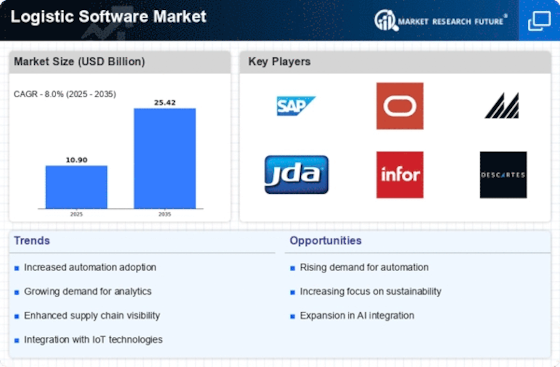Top Industry Leaders in the Logistic Software Market
Competitive Landscape of the Logistic Software Market
The logistic software market is revving up, propelled by the insatiable demand for e-commerce fulfillment, complex global supply chains, and the relentless march of technological innovation. In this dynamic arena, understanding the competitive landscape is crucial for both established players and aspiring entrants.
Key Players:
- Advantech Corporation
- Digilogistics
- UTI Worldwide Inc.
- Hexaware Technologies
- IBM Corporation
- JDA Software
- Oracle
- Samsung Electronics Co
- SAP AG
- Tech Mahindra
Strategies Fueling the Engines:
-
Acquisitions and Integrations: Mergers and acquisitions are commonplace, as established players seek to expand their portfolio, acquire new technologies, and enter new markets. For example, Manhattan Associates' acquisition of WMS provider Atlas Logistics, and JDA Software's merger with Blue Yonder, reflect this trend. -
Technology Embraces: Embracing AI, machine learning, and predictive analytics is key to optimizing logistics operations. Players like SAP with Leonardo and Oracle with Oracle Transportation Management Cloud are integrating these technologies for better demand forecasting, route optimization, and real-time tracking. -
Customer-Centric Approach: Providing excellent customer service and personalized solutions is critical for success. Offering training, consulting, and implementation support helps customers maximize the value of their software investments.
Navigating the Dashboard: Factors for Market Share Analysis:
-
Product Breadth and Depth: Offering a comprehensive suite of solutions across various logistics functions can attract larger customers, while specialized solutions cater to niche needs. -
Technology Leadership: Continuous investment in AI, automation, and cloud-based technologies is crucial for staying ahead of the curve. -
Global Reach and Scalability: Ability to support complex multinational operations and scale to meet customer growth is essential for large enterprises. -
Pricing Models and Flexibility: Balancing subscription models with on-premise options and catering to diverse budgets can attract a wider customer base.
Emerging Stars on the Horizon:
-
Blockchain Platforms: Companies like Kaleido and TradeLens are leveraging blockchain for secure and transparent supply chain visibility, offering enhanced trust and traceability. -
Hyperlocal Delivery Startups: Players like Zepto and Swiggy Genie are catering to the need for on-demand, hyperlocal deliveries, revolutionizing last-mile logistics in urban areas. -
Autonomous Vehicles and Drones: Technological advancements in autonomous vehicles and drones have the potential to disrupt traditional transportation and delivery models, opening doors for new entrants.
Investment Trends Revving Up:
-
Focus on Niche Solutions: Venture capitalists are increasingly investing in niche players offering innovative solutions for specific logistics challenges, such as drone delivery or warehouse automation. -
Integration with IoT and Sensors: Investments in solutions that integrate with IoT sensors and devices to gather real-time data and optimize operations are gaining traction. -
Sustainability and Green Logistics: Growing demand for sustainable logistics practices is pushing investments in solutions that reduce carbon footprint and optimize fuel efficiency.
Latest Company Updates:
February 20, 2024: Manhattan Associates launches a new transportation management system (TMS) with advanced optimization capabilities.
February 13, 2024: Logixal launches a new AI-powered platform for logistics planning and execution.
February 16, 2024: The European Commission proposes new regulations on data sharing in the logistics industry.
January 23, 2024: The World Economic Forum releases a new report on the future of logistics.










